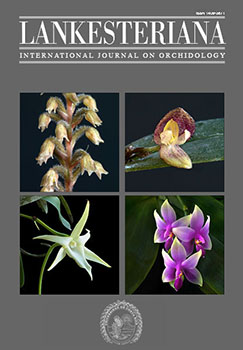Two new species of <i>Telipogon</i> (Orchidaceae: Oncidiinae) from Costa Rica
DOI:
https://doi.org/10.15517/lank.v24i1.59556Keywords:
biodiversity, Neotropical orchids, new species, Orchidaceae, taxonomyAbstract
The Neotropical genus Telipogon (Orchidaceae: Oncidiinae), comprising approximately 250 species, exhibits remarkable species diversity in the humid, montane forests of southern Central America and the Tropical Andes. Telipogon, when broadly defined, encompasses both the large-flowered species that mimic tachinid flies and the small-flowered species formerly classified under Stellilabium. In Costa Rica, this genus includes 55 species, with 16 classified as small-flowered species. While the large-flowered species of Telipogon (in the strict sense) have been taxonomically revised, the small-flowered species have yet to be the subject of a thorough taxonomic revision. Our research aims to partially fill this gap by focusing on a comparative morphological analysis of two novel small-flowered Telipogon species. We describe and illustrate Telipogon lateritius and T. muntzii, both discovered in the humid mid-elevation forest of the Caribbean watershed in Cordillera de Talamanca, Costa Rica. Telipogon lateritius is notable for its distinctive brick-colored flowers, featuring sepals, petals, and lips striped in chestnut brown; the lateral sepals connate into a triangular-ovate synsepal, complemented by sparse, stiff pubescence at the base of the lip. Telipogon muntzii, although closely resembling T. anacristinae, differs in its unique olive-green flowers, sparse trichomes on the lip, narrowly oblong lateral lobes of the column, and a helmet-shaped median lobe of the column exclusively covered by simple trichomes. This study provides new additions for a future taxonomic revision of Telipogon in Costa Rica.
Downloads
References
Amezcua-Trigos, M., Pérez-Farrera, M. A., Archila, F., Cházaro-Basáñez, M. & Sosa, V. (2018). A New Species of Telipogon (Orchidaceae) from Mexico and its Phylogenetic Position among MesoAmerican Species. Systematic Botany, 43(1), 9–16. https://doi.org/10.1600/036364418X697067
Bogarín, D. (2012). A new Telipogon from Mexico close to Telipogon standleyi (Orchidaceae: Oncidiinae). Lankesteriana: International Journal on Orchidology, 12(2). https://doi.org/10.15517/lank.v0i0.11761
Boza, M. A. (1986). Parques Nacionales Costa Rica. Fundación de Parques Nacionales, Costa Rica. Incafo, Madrid.
Dodson, C. H. & Escobar, R. (1987a). The Telipogons of Costa Rica I. Orquideología, 38(2), 1–69.
Dodson, C. H. & Escobar, R. (1987b). The Telipogons of Costa Rica II. Orquideología, 17(1), 71–137.
Dressler, R. L. (1993). Phylogeny and Classification of the Orchid Family. Dioscorides Press. Portland. Dressler, R. L. (1999). Reconsideration of Stellilabium and Dipterostele. Harvard Papers in Botany, 4(2), 469–473.
Dressler, R. L. (2001). Stellilabium erratum, a comedy of blunders. Lankesteriana, 1(2), 11–13.
Kolanowska, M., Trejo, R. M. & Lipińska, M. (2017). A new species of Stellilabium (Orchidaceae) segregated from S . morganiae. Polish Botanical Journal, 62(1), 21–26. https://doi.org/10.1515/pbj-2017-0002
Martel, C., Edquen, J., Collantes, B. & Ocupa, L. (2020a). Telipogon chachapoyensis (Orchidaceae), a New Species from Peru Similar to T. microglossus. Systematic Botany, 45(2), 227–232. https://doi.org/10.1 600/036364420X15862837791285
Martel, C., Francke, W. & Ayasse, M. (2019). The chemical and visual bases of the pollination of the Neotropical sexually deceptive orchid Telipogon peruvianus. New Phytologist, 223, 1989–2001. https://doi. org/10.1111/nph.15902
Martel, C., Neubig, K. M., Williams, N. H. & Ayasse, M. (2020b). The uncinate viscidium and floral setae, an evolutionary innovation and exaptation to increase pollination success in the Telipogon alliance (Orchidaceae: Oncidiinae). Organisms Diversity and Evolution, 20(3), 537–550. https://doi.org/10.1007/ s13127-020-00457-w
Neubig, K. M., Whitten, W. M., Williams, N. H., Blanco, M. A., Endara, L., Burleigh, J. G., Silvera, K., Cushman, J. C. & Chase, M. W. (2012). Generic recircumscriptions of Oncidiinae (Orchidaceae: Cymbidieae) based on maximum likelihood analysis of combined DNA datasets. Botanical Journal of the Linnean Society, 168(2), 117–146. https://doi.org/10.1111/j.1095-8339.2011.01194.x
Pabón-Mora, N. & González, F. (2008). Floral ontogeny of Telipogon spp. (Orchidaceae) and insights on the perianth symmetry in the family. International Journal of Plant Sciences, 169(9), 1159–1173. https:// doi.org/10.1086/591982
Pérez-Escobar, O. A., Rodríguez, L. K. & Martel, C. (2017a). A new species of Telipogon (Oncidiinae; Orchidaceae) from the paramos of Colombia. Phytotaxa, 305(4), 262–268.
Pérez-Escobar, O. A., Chomicki, G., Condamine, F. L., Karremans, A. P., Bogarín, D., Matzke, N. J., Silvestro, D. & Antonelli, A. (2017b). Recent origin and rapid diversification of Neotropical orchids in the world’s richest plant biodiversity hotspot. New Phytologist, 215(2), 891–905.
POWO. (2024, August 1st). Plants of the World Online. Facilitated by Kew Royal Botanic Gardens. Retrieved from https://powo.science.kew.org/
Pupulin, F. (2003). Two new species of Stellilabium (Orchidaceae: Telipogoninae) from Costa Rica. Harvard Papers in Botany, 8(1), 29–34.
Pupulin, F. & Bogarín, D. (2023). Telipogon Kunth. In F. Pupulin & collaborators (Eds.), Vanishing Beauty: native Costa Rica orchids. Vol. 3. Restrepia–Zootrophion and Appendices (pp. 1247–1273). Oberreifenberg: Koeltz Botanical Books.
Pupulin, F., Bogarín, D. & Karremans, A. P. (2023). The Lankester Catalogue of Costa Rican Orchidaceae. Lankesteriana: International Journal on Orchidology, 23(Supplement), 1–254. https://doi. org/10.15517/lank.v23iSupplement.58145
Williams, N., Whitten, W. & Dressler, R. (2005). Molecular Systematics of Telipogon and its allies: nuclear and plastid DNA sequence data. Lankesteriana: International Journal on Orchidology, 5(3), 163–184. https://doi.org/10.15517/lank.v5i3.19754

Published
How to Cite
Issue
Section
License
Copyright (c) 2024 Lankester Botanical Garden, University of Costa Rica

This work is licensed under a Creative Commons Attribution-NonCommercial-NoDerivatives 3.0 Unported License.
According to the Open Access policy promoted by the University of Costa Rica, all the papers published by Lankesteriana are licensed under the Creative Commons copyright and can be downloaded free of charge. The journal holds copyright and publishing rights under the CC BY-NC-ND 3.0 CR license.
Before the publication of the materials submitted by the author(s) in LANKESTERIANA, the author(s) hereby assign all rights in the article to the Lankester Botanical Garden.




